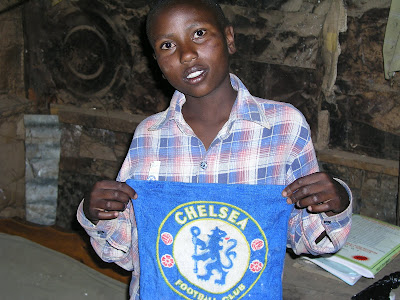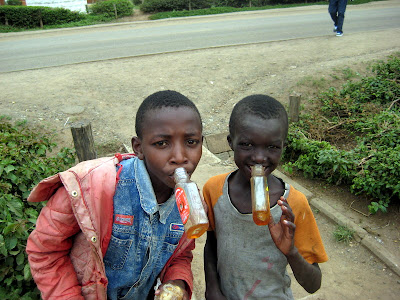I realized that I have talked a lot about my impressions of Kenya but I failed to really describe what I do on a daily basis.
I wake up between 7:15 and 8am in the fabulous rondoval that I live in. On Mondays and Fridays there is a flag ceremony where the girls put up the flag, sing the national anthem and other songs, and do some prayers before class starts.

The Rondoval I call home
I usually attend that and then eat breakfast. Breakfast is a kind of porridge called Uji that tastes a little bit like liquid sugar mixed with dirt (that is not an insult, I am trying to be descriptive). Usually there is something else with it like fruit (a green orange or a banana), a pancake, or a mandazi (a deep fried bread thing like a doughnut but without the sugar) and sometimes a hard boiled egg.
My duties at the school are to help with whatever they want. Sometimes that means working in the garden pulling weeds, cleaning out storage, finding the girls who need new shoes, getting the dorms ready for the new girls. I am also the unofficial videographer. Mostly however, in the morning, I have time to work on my projects that I will explain later.
Lunch is at 12:20 and it is usually Gatheri which is a combination of maize (like corn just bigger and harder), potatoes, beans, sweet potatoes mixed together. Sometimes we get beans and rice. Other times the dreaded Ugali with cabbage or kale (like spinach).
One of my biggest projects is that I implemented Salesforce.com for use as a donor database for the foundation while I was still in the United States. I act as an administrator for the system so sometimes I have to change settings or add users or compile an email list for a mailing. Recently we have implemented Vertical Response as an email marketing system for our newsletter and event information. I also work with the other volunteers who are heading up the online marketing campaigns (Become a fan of Daraja Academy on Facebook to see what we are doing). Most of this work must be done off campus because it requires the internet but sometimes I brave the terrible cellular modem.
I am partially in charge of special evening activities for the girls. We have put on a bonfire, a talent show, a birthday party, improv games, a dancing night and a few movie nights.
I head up the Drama and Music Club with teacher Catherine. We meet on Mondays and we work with the girls on the performing arts. Right now we are working on a spoken word piece for the Kenya Music Festival. The girls are amazing at acting and singing. Other clubs that the girls can choose from are: The Grassroots Girls (helping them get in touch with grassroots organizations in the area so they can help empower women), The Media Club (teaching girls about journalism and multimedia including cameras, video cameras, facebook, twitter and email newsletters), the Art and Crafts club (working on visual art such as painting, drawing, bead working and sculpture), the Environmental Club (teaching about nature and ways to reverse the affects of pollution), and the Science Club (a place where nerds can get together and scheme for world domination).
In addition I have been supervising the P.E. program. The new volunteers that come in often teach P.E. and I have been trying to provide some continuity with the programs ie. making sure there is someone to supervise each activity and give them a grade at the end of the term. We have been playing football (read: soccer), volleyball, netball, cricket, rounders and cross country running amongst other things.
At around 530pm almost everyday I turn my eyes to the sky and watch the beautiful Kenyan sunset. The African sky is more beautiful than anything I have seen in my life. I don’t know if it is because of the altitude (we are around 6 thousand feet) or if it is a result of being on the equator or some other factor (atmospheric science majors, here is your chance to chime in and do some good for the world). The sky is full of a million clouds that are all perfectly defined against the backdrop of unbelievably blue sky. Furthermore the clouds seem so close, its like you can see every slight crevasse, it is almost possible to reach up and touch them. The sky also appears to extend far beyond where a “normal” sky would go. It seems to me that there is a full 180’ of sky and that I have only been used to 100’. I know this is not logical, but it is magical. The sunset exists not only in the West but it begins at three places in the sky, eventually echoing across the heavens in their entirety.
Dinner is at six o'clock so I have 30 minutes to eat before computer class. When I came to Kenya I brought a couple of donated laptop computers with me (thank you Dad, Skip and Tom for all your help in making that happen). The goal was to set up a computer lab for the girls. I have rounded up 5 working laptops and about a month and a half ago I started teaching the girls basic computing skills every weekday for about an hour. It is amazing to see how enthusiastic the girls are. Most of them have never used a computer so when they click a button with the mouse and something happens there is a collective gasp of “wow” from all the girls. When school resumes at the end of April I plan on teaching a computer class to the staff on weekends.
The electricity goes on at 6pm and stays on until 10 pm. Two days a week I tutor one of the girls in English. She has such a strong desire to learn and never makes the same mistake twice.
If I have waited this long to shower usually I will put it off until the next day. We are extremely lucky in that we have running water. It has taken some getting used to however because the solar panel that heats our shower water leaves much warmth to be desired. After sundown it is almost impossible to bear the inevitably cold showers. The water is also pumped from the river into a holding tank. When it comes out of the faucet it appears brown and I always find myself wondering how getting under it will possibly make me more clean. These are really trifling annoyances compared with the bliss that life in Africa has provided for me.


















